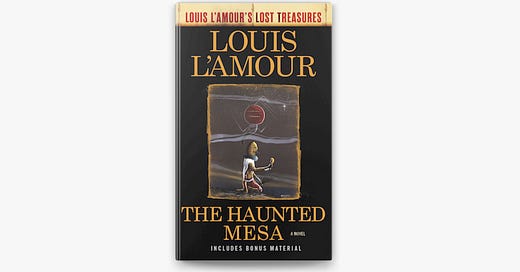The Haunted Mesa by Louis L'Amour Is Not Exactly A Sci-Fi Novel Though It's Billed As Such
Louis L'Amour's The Haunted Mesa stands as one of the strangest entries in the legendary Western author's extensive catalog, a departure from his usual gunfighters and frontier settlements into the realm of supernatural mystery. Published in 1987, this novel represented a creative risk for L'Amour, who was venturing far from the familiar territories that had made him America's most beloved Western writer. Despite the challenges this genre shift presented, the book proved its commercial appeal by becoming a New York Times #1 bestseller, demonstrating that L'Amour's storytelling prowess could transcend genre boundaries.
While often marketed and categorized as science fiction, The Haunted Mesa doesn't fit that mold in the traditional sense. Rather than relying on advanced technology, scientific speculation, or futuristic concepts, L'Amour crafts something that feels more like horror tinged with fantasy elements. The supernatural occurrences, otherworldly beings, and mystical portals belong more to the realm of dark fantasy than science fiction. This genre confusion might have contributed to some readers' mixed expectations and reactions among readers, as those seeking classic sci-fi may have been surprised by the story's more mystical, horror-adjacent approach.
The story follows Mike Raglan, a paranormal investigator who specializes in debunking supernatural phenomena, as he's drawn to the haunting mesas of the American Southwest by an urgent plea from an old friend. What begins as a routine investigation into mysterious disappearances soon evolves into something far more sinister, as Raglan uncovers connections to the ancient Anasazi people and their sudden, unexplained vanishing centuries ago. L'Amour weaves together Navajo legends, parallel world theories, and genuinely unsettling supernatural encounters to create what one reviewer aptly described as a "weird western" that's equal parts adventure and atmospheric horror.
The novel's strength lies in its compelling opening act. L'Amour builds atmosphere and dread, drawing readers into the mystique of the Southwest's ancient ruins and the enduring mystery of the Anasazi civilization. His deep knowledge of the region's geography, history, and Native American cultures serves him well here, grounding the fantastical and horrifying elements in authentic historical and cultural details. The initial mystery hook is genuinely captivating, with L'Amour demonstrating that his ability to create tension and suspense translates effectively into darker, more supernatural territory.
However, the novel's ambitious scope occasionally works against it. In what appears to be an effort to expand the story to novel length, certain sections feel unnecessarily padded, particularly in the middle portions where the narrative momentum slows considerably. This pacing issue undermines some of the suspense and mounting dread that L'Amour builds so effectively in the opening, creating stretches where readers might find their attention wandering. The author, perhaps uncertain about how much exposition and world-building his new genre required, seems to have erred on the side of over-explanation rather than trusting his readers to follow his imaginative leaps into the supernatural.
The conclusion, while bringing the various plot threads together, lands with less impact than the strong setup promises. After such an intriguing buildup and the establishment of genuinely otherworldly stakes, the resolution feels somewhat anticlimactic. It's as if L'Amour, having ventured so far from his comfort zone into horror and fantasy territory, wasn't entirely sure how to stick the landing in this unfamiliar realm.
Despite these structural issues, The Haunted Mesa remains an entertaining and worthwhile read. L'Amour's prose retains its characteristic readability and forward momentum, even when dealing with interdimensional portals and supernatural threats rather than cattle drives. The book showcases an admirable willingness to experiment and grow as a writer, even late in a highly successful career. Critics and readers recognized this courage, with many noting that L'Amour's natural storytelling instincts served him well in crafting atmospheric, unsettling scenes that wouldn't be out of place in a classic horror anthology.
7/10 overall.
Support an alternative to mainstream publishing. Sign up for the Jon Del Arroz newsletter and get THREE FREE BOOKS and stay up to date on deals and new releases from an author doing the good work.







Yeah, this is pretty much how I felt about it when I read it a long while back. A good start, a slower middle, and an ending that felt kinda rushed. It's still an interesting book, though, and I'd like to read more supernatural/weird/horror stories set in the Southwest, dealing with the mythology of the region.